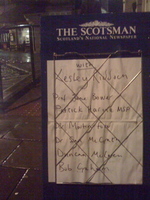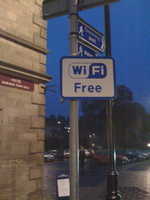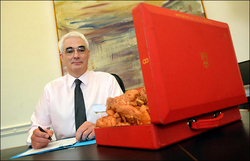Patrick Harvie and I went to Jedburgh on Monday night, where Patrick spoke in the Scotsman/BBC debate on renewables, as
covered by Jenny Haworth for the Scotsman. The debate, chaired by the authoritative and engaging Lesley Riddoch, will also be broadcast on the BBC tomorrow at 2pm.
There were about 50 people there, which was a bit disappointing, and about two thirds of them were from the very anti-wind-farm brigade, who obviously saw this as a grand opportunity to stick one up the environmentalists. There was also a wee gang from the Borders Greens, too, but they were far more polite and less rowdy, unfortunately.

The audience may have been predominantly anti-wind, but the platform was not. Patrick was joined by Duncan McLaren of
Friends of the Earth Scotland, Dr Siân McGrath from
Aquamarine Power (disclosure: I did some work for Aquamarine last year, so am biased in favour), and Martin Ford, the Aberdeenshire councillor who said no to Trump.
On the other side, the panel consisted of Professor Jane Bower, who has a science background as well as having worked in the oil industry, but who kept pretty quiet, and a certain Bob Graham.
It's hard to know where to begin with Bob Graham. His past lives include the oil industry, the RAF, and being
hauled over the coals for lying about renewables.

Incidentally, the main change I noticed since I last went to Jedburgh was the profusion of signs declaring Jedburgh to be "WiFi Free". Appalled, I thought the anti-turbine brigade had also taken against WiFi, which
isn't entirely implausible. But no, it's just that they put the words in the wrong order, and I got good strong signal at the back of the hall.
This allowed me to fact-check Bob Graham as the event went on, which made it pretty clear why he's been in trouble with the Advertising Standards Authority.
Every single claim about the ineffectiveness of wind power he made was unsubstantiated. False. Pure propaganda. Let's start.
"The Germans have about 23,000 wind turbines. They are currently building 26 coal-fired power stations and have just commissioned three gas-fired power stations. They have seen no reduction in their emissions."
The numbers of turbines and coal plant proposals
seems right, fair enough, but no reduction? Actually, since 1990 they've seen a
20% reduction in their emissions. In the debate he made the same allegation against Denmark, which was also untrue - their
equivalent number is 14%.
"Scotland requires at peak times six gigawatts of electricity. If you rely on renewables to generate all of that from wind, that would reduce global levels by 0.09 of 1 per cent."
Actually, global installed capacity is 4,300 gigawatts. Sure, Scotland's 6 gigawatts aren't a huge proportion of that, but if Scotland went entirely over to clean energy, it would be
.14 of one percent, almost fifty percent more than Bob Graham would have us believe.
This is a minor point, true, especially given the overwhelming wrongness of the idea that we should do nothing because we can't solve the problem all by ourselves. What if everyone took that approach?
"I don't happen to subscribe to climate change and a lot of sensible people don't."
Name one, Bob. You don't count. But at least you came out as an utter wingnut - the live audience may have lapped it up, but the Radio Scotland audience are less likely to do so.
"Renewables can't replace base load."
Actually, this is
pure fallacy. There's plenty of renewable technologies that can replace baseload, including hydroelectric, geothermal and biomass. What's more, the more diverse renewable capacity you build, the less you need other kinds of baseload.
More generally, I find this kind of attitude exceptionally frustrating. I believe in debate, of course. I don't mind people starting with the facts and recommending different courses of action, but I object when someone's case rests on a series of falsehoods. Communities who've found turbines going up in their area are often annoyed about it, although where people have a proper stake that tends not to be the case.
With this in mind, there are plenty of people who want to see wind power blocked, and they'll clutch at any straw going if someone suggests wind doesn't work. They'll believe the most extraordinary stuff - one audience member asked the panel why we send power through the grid to turn the turbines when there's no wind. Bob Graham didn't agree with that, or dispute it, but nonetheless he is trying to build ignorance and misunderstanding, all driven by a desire to see
more nukes.
As a footnote, Martin Ford is very impressive in person, even more than I expected. He's been
appallingly treated for doing the right thing, and I hope John Swinney gives him what he wants above all else - a rejection of Trump's financially and environmentally unsustainable vanity project.
 Nicholas Christian has a classic media revenge story in today's Scotland on Sunday, in which someone at the Press Association has spilled the beans about a heavy-handed phone call from an SNP special adviser.
Nicholas Christian has a classic media revenge story in today's Scotland on Sunday, in which someone at the Press Association has spilled the beans about a heavy-handed phone call from an SNP special adviser.









